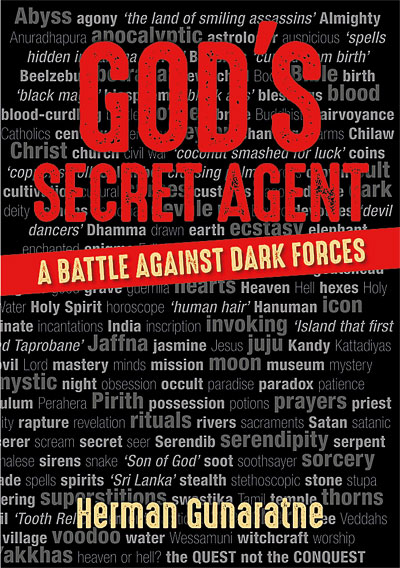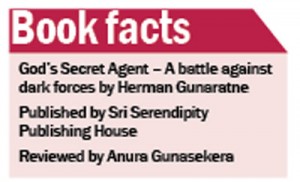Exploring the fractured human psyche
View(s): At the recent launching of the book, God’s Secret Agent at the beautiful Mirissa Hills boutique hotel, Dr. A.G.N. de Silva, an eminent obstetrician and classmate of the author at S. Thomas’ Mount Lavinia, delivered the key-note address. He described his old friend, referring to the many diverse facets of his personality, as being “Extraordinaire”.
At the recent launching of the book, God’s Secret Agent at the beautiful Mirissa Hills boutique hotel, Dr. A.G.N. de Silva, an eminent obstetrician and classmate of the author at S. Thomas’ Mount Lavinia, delivered the key-note address. He described his old friend, referring to the many diverse facets of his personality, as being “Extraordinaire”.And extraordinary they are both the book and its author. It is possibly only Herman Gunaratne, much of whose real life has been stranger than fiction who could have gone through such barely credible experiences and then mustered the confidence to write a book about it. Herman always raises controversy; he stimulates and provokes and he raises hackles. With this book he will also raise a few goose bumps.
It is a book about things that are normally kept secret. It is about evil acts committed by ordinary, otherwise law-abiding people, with the assistance of self-proclaimed experts in what may be loosely termed , “ Black Arts”. It is about excursions undertaken in stealth, under cover of darkness, in strange places, quite often at the risk of serious physical danger to the participants. The incidents described in the book would normally be only discussed in whispers, amongst close friends. Both victims and perpetrators may prefer to deny them, as most people would be reluctant to publicly acknowledge their patronage of primitive rites and rituals, that are much older than any organised religion. Herman, with his customary disregard for convention and protocol, has exposed this hidden aspect to the uncomfortable glare of the public.
There is a dark side to the lives of most conventional people, irrespective of the religion that they subscribe to publicly, leading what are commonly called very respectable lives, engaged in lucrative businesses and well paid jobs ; very ordinary existences with no apparent aberrations in lifestyle. This dark side is also common to all social and economic levels of society. The recital of personalities portrayed in the book is incontrovertible proof of that statement.
Perhaps it is that all human beings possess and are driven by this race memory, engaging a time in pre-history , when the physical world was ruled by ignorance and the Shaman ruled the spiritual world. It must never be forgotten that the Shaman, the witch doctor, the sorcerer and the wizard, preceded the sage, the philosopher and the Messiah, by many thousands of years. The ancient cave paintings of prehistoric man are only a primitive precursor of what is found in ancient temples, which precede religions such as Buddhism , Christianity and Islam, whilst Hinduism, with its teeming pantheon of deities, both benign and malign, still patronizes the belief system which lends support to so-called dark arts.
To understand Herman’s book and the incidents that he describes, the reader, irrespective of the belief system he follows, needs to take an inward look at his/her society. Herman’s book, at its simplest level, is about the confrontation between Good and Evil. The good is represented by the “Exorcist”, who comes armed with the power of God, or Christ. The evil is represented by the individual who harnesses so-called evil deities, which are quite commonly represented in all Hindu temples and not infrequently, are also featured in Buddhist temples.
Buddhist devotees, with great devotion and humility, will place flowers before the statue of the compassionate Buddha, accompanied by the recitation of stanzas affirming their commitment to the Buddhist way of life. Immediately thereafter, they will move on to plead or perform obeisance before the statues of deities, said to possess the power to dispense both punishment and favour, apparently on the understanding that the supplicant will return the divine favour with a specified act of gratitude or restitution.
There is this strange dichotomy of belief in this country, where Buddhism is the predominant faith -and no doubt, in other countries as well - where the line becomes blurred, between the conventional religion, the faith of one’s ancestors that one observes as a routine practice, and the magical invocation to deities who dispense favour, punishment and, also, enable revenge against enemies.
The reality is that all over the world, underneath the great religions and philosophies that extol virtuous conduct and compassion to all, which are followed by devoted adherents, there lies a shadowy, seamy world of subterranean practices, patronized by the very same people. It is this ugly dichotomy, this fracture in the human psyche, that Herman explores in his book, through the recital of a series of incidents in which he has been both participant and observer, over a period of a few years.
Curses, the invocation of evil powers to achieve evil ends, have been part of human belief systems before written history. It is a fact confirmed by archaeological finds the world over, in disparate ancient communities totally disconnected from each other. In some communities the belief and reliance on supernatural forces primarily bent on evil, takes precedence over conventional faiths. In communities, more advanced socially, technically and intellectually, these forces are invoked in secret, in tandem with the conventional religious observances which are in the public domain. This last is the society that this book is all about.
Nissanka Wimalasuriya is the enigmatic man of God, who represents the forces of the Good, to whom victims of inexplicable maladies and unacceptable vicissitudes have turned to for succour, when all other avenues of relief have failed. He comes armed only with his faith in God, Christ, goodness and blessed water; with the unshakeable belief that the Holy Trinity has the power to overcome any evil.
The battleground on which these encounters take place is the highly insular, and in many ways quite sophisticated, plantation society, then governed largely by the many conventions of conduct set in place by the British, and perpetuated even after their exit by the many Ceylonese who replaced them. This society also includes me, the writer. It seems an unlikely environment for the practice of witchcraft, the harnessing of dark, evil forces to achieve both honourable and dishonourable ends. Such acts are commonly perceived to be the stock-in-trade of ordinary people, lacking in education and sophistication, and not of those who dress for dinner even with close friends, and who patronize exclusive clubs and also play tennis and golf!
Yet, the reality is that life imitates art and, sometimes, as Herman’s book suggests, much stranger than fiction.
The late Nissanka, “God’s Secret Agent”, was a simple , unpretentious man and an exceptionally gifted musician who played most instruments with casual ease and virtuosity. He was also irresistibly likable. Herman’s book is also as much about this ordinary man, as it is about the extraordinary things he did.
It is perhaps unusual for a protagonist in many of the events described in a book based on actual happenings, to write a review of the book, thereafter. In that context this writing is as much a review, as it is a validation of the events so vividly portrayed by Herman. What he has not written about would be sufficient for another book.
The reality is that the strange happenings detailed in “God’s Secret Agent” did take place, in the presence of many onlookers and participants. As a reviewer, I must remain impartial and objective but as an active participant in many of those strange events, I am also compelled to vouch for their veracity. I do not subscribe actively to any religious practice or faith and am, essentially, atheistic in outlook and practice. However, having seen Nissanka, “God’s Secret Agent” at work, I must confess that I have no rational explanation for the outcomes he produced.
Nissanka, born to a family steeped in the Buddhist faith and committed to related practices, believed that he was directed by the Holy Trinity. My personal belief system, based on a strongly atheistic outlook, rebuts Nissanka’s claims as to the sources of his empowerment. So, my final conclusion, having watched Nissanka in many of his missions, is that he, in all respects an ordinary man, also possessed extraordinary faculties which he always deployed for beneficial ends.
Herman is a master story teller, a peerless raconteur. In “God’s Secret Agent” he has produced a great read, which would have been absorbing as a work of fiction. That it deals with factual happenings and actual people makes it even more attractive.


